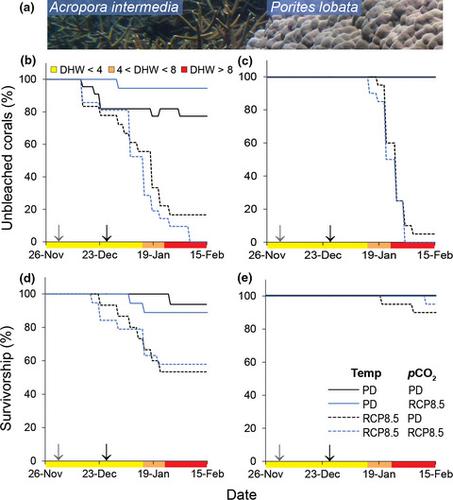当前位置:
X-MOL 学术
›
Glob. Change Biol.
›
论文详情
Our official English website, www.x-mol.net, welcomes your feedback! (Note: you will need to create a separate account there.)
Paradise lost: End-of-century warming and acidification under business-as-usual emissions have severe consequences for symbiotic corals.
Global Change Biology ( IF 11.6 ) Pub Date : 2020-01-18 , DOI: 10.1111/gcb.14998 Rene M van der Zande 1, 2 , Michelle Achlatis 1, 2 , Dorothea Bender-Champ 1, 2 , Andreas Kubicek 1, 2 , Sophie Dove 1, 2 , Ove Hoegh-Guldberg 1, 2, 3
Global Change Biology ( IF 11.6 ) Pub Date : 2020-01-18 , DOI: 10.1111/gcb.14998 Rene M van der Zande 1, 2 , Michelle Achlatis 1, 2 , Dorothea Bender-Champ 1, 2 , Andreas Kubicek 1, 2 , Sophie Dove 1, 2 , Ove Hoegh-Guldberg 1, 2, 3
Affiliation

|
Despite recent efforts to curtail greenhouse gas emissions, current global emission trajectories are still following the business-as-usual representative concentration pathway (RCP) 8.5 emission pathway. The resulting ocean warming and acidification have transformative impacts on coral reef ecosystems, detrimentally affecting coral physiology and health, and these impacts are predicted to worsen in the near future. In this study, we kept fragments of the symbiotic corals Acropora intermedia (thermally sensitive) and Porites lobata (thermally tolerant) for 7 weeks under an orthogonal design of predicted end-of-century RCP8.5 conditions for temperature and pCO2 (3.5°C and 570 ppm above present-day, respectively) to unravel how temperature and acidification, individually or interactively, influence metabolic and physiological performance. Our results pinpoint thermal stress as the dominant driver of deteriorating health in both species because of its propensity to destabilize coral-dinoflagellate symbiosis (bleaching). Acidification had no influence on metabolism but had a significant negative effect on skeleton growth, particularly when photosynthesis was absent such as in bleached corals or under dark conditions. Total loss of photosynthesis after bleaching caused an exhaustion of protein and lipid stores and collapse of calcification that ultimately led to A. intermedia mortality. Despite complete loss of symbionts from its tissue, P. lobata maintained small amounts of photosynthesis and experienced a weaker decline in lipid and protein reserves that presumably contributed to higher survival of this species. Our results indicate that ocean warming and acidification under business-as-usual CO2 emission scenarios will likely extirpate thermally sensitive coral species before the end of the century, while slowing the recovery of more thermally tolerant species from increasingly severe mass coral bleaching and mortality. This could ultimately lead to the gradual disappearance of tropical coral reefs globally, and a shift on surviving reefs to only the most resilient coral species.
中文翻译:

失去的天堂:世纪末的变暖和酸化在一切照旧的排放下对共生珊瑚产生了严重后果。
尽管最近努力减少温室气体排放,但当前全球排放轨迹仍遵循照常代表性浓度路径 (RCP) 8.5 排放路径。由此产生的海洋变暖和酸化对珊瑚礁生态系统产生变革性影响,对珊瑚生理和健康产生不利影响,预计这些影响在不久的将来会恶化。在这项研究中,我们将共生珊瑚 Acropora intermedia(热敏感)和 Porites lobata(耐热)的碎片在预测的本世纪末 RCP8.5 温度和 pCO2 条件(3.5°C)的正交设计下保存了 7 周。和 570 ppm(分别比现在高 570 ppm),以揭示温度和酸化如何单独或相互作用地影响代谢和生理性能。我们的研究结果表明,热应激是导致这两个物种健康状况恶化的主要驱动因素,因为它容易破坏珊瑚-甲藻共生(白化)。酸化对新陈代谢没有影响,但对骨骼生长有显着的负面影响,特别是在缺乏光合作用的情况下,例如在漂白的珊瑚中或在黑暗条件下。白化后光合作用的完全丧失导致蛋白质和脂质储存耗尽以及钙化崩溃,最终导致中间甲藻死亡。尽管其组织中的共生体完全丧失,但 P. lobata 仍保持少量的光合作用,并且脂质和蛋白质储备的下降较弱,这可能有助于该物种更高的存活率。我们的研究结果表明,在二氧化碳排放照常的情况下,海洋变暖和酸化可能会在本世纪末之前消灭对热敏感的珊瑚物种,同时减缓更耐热的物种从日益严重的大规模珊瑚白化和死亡中恢复的速度。这最终可能导致全球热带珊瑚礁逐渐消失,幸存的珊瑚礁将变成只有最具复原力的珊瑚物种。
更新日期:2020-02-18
中文翻译:

失去的天堂:世纪末的变暖和酸化在一切照旧的排放下对共生珊瑚产生了严重后果。
尽管最近努力减少温室气体排放,但当前全球排放轨迹仍遵循照常代表性浓度路径 (RCP) 8.5 排放路径。由此产生的海洋变暖和酸化对珊瑚礁生态系统产生变革性影响,对珊瑚生理和健康产生不利影响,预计这些影响在不久的将来会恶化。在这项研究中,我们将共生珊瑚 Acropora intermedia(热敏感)和 Porites lobata(耐热)的碎片在预测的本世纪末 RCP8.5 温度和 pCO2 条件(3.5°C)的正交设计下保存了 7 周。和 570 ppm(分别比现在高 570 ppm),以揭示温度和酸化如何单独或相互作用地影响代谢和生理性能。我们的研究结果表明,热应激是导致这两个物种健康状况恶化的主要驱动因素,因为它容易破坏珊瑚-甲藻共生(白化)。酸化对新陈代谢没有影响,但对骨骼生长有显着的负面影响,特别是在缺乏光合作用的情况下,例如在漂白的珊瑚中或在黑暗条件下。白化后光合作用的完全丧失导致蛋白质和脂质储存耗尽以及钙化崩溃,最终导致中间甲藻死亡。尽管其组织中的共生体完全丧失,但 P. lobata 仍保持少量的光合作用,并且脂质和蛋白质储备的下降较弱,这可能有助于该物种更高的存活率。我们的研究结果表明,在二氧化碳排放照常的情况下,海洋变暖和酸化可能会在本世纪末之前消灭对热敏感的珊瑚物种,同时减缓更耐热的物种从日益严重的大规模珊瑚白化和死亡中恢复的速度。这最终可能导致全球热带珊瑚礁逐渐消失,幸存的珊瑚礁将变成只有最具复原力的珊瑚物种。



























 京公网安备 11010802027423号
京公网安备 11010802027423号